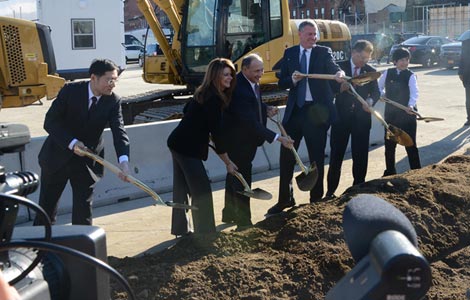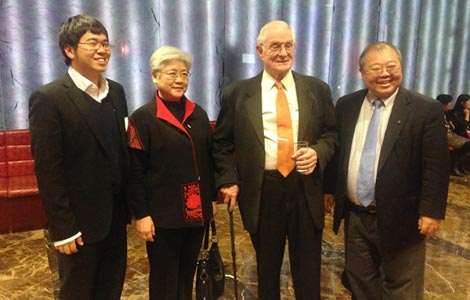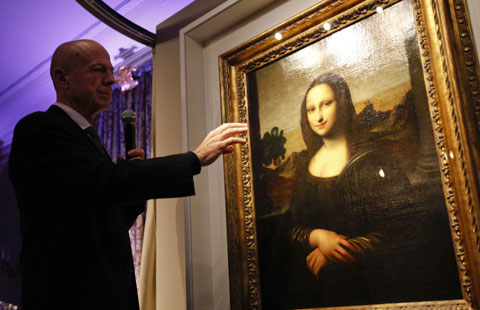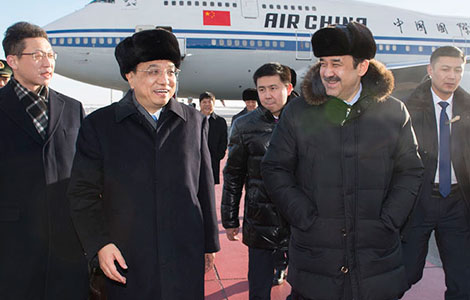China-US trade talks get started in Chicago
Updated: 2014-12-16 11:50
By Chen Weihua in Washington and Pu Zhendong in Beijing(China Daily USA)
|
||||||||
Senior Chinese and US officials will convene the 25th Joint Commission on Commerce and Trade (JCCT) in Chicago on Tuesday, and will seek to address differences on trade and investment potential in areas such as agriculture and tourism. Vice Premier Wang Yang leads the Chinese delegation. The US side is represented by Secretary of Commerce Penny Pritzker and US Trade Representative Michael Froman.The three-day meeting will mark the first time the JCCT will include a full day of events designed to facilitate private sector engagement with officials from Chinese and US governments, according to the US Department of Commerce.
The meeting will also involve reviewing progress toward a bilateral investment treaty. China and the US started a five-day 17th round of talks on a treaty on Dec 11 in Beijing.
In a preview of the meeting, Pritzker said on Dec 12 that Chicago was chosen as the site for the talks "as part of our effort to reimagine and reinvigorate the JCCT."
"The goal of the JCCT is to build upon the president's recent visit to China and meetings with President Xi Jinping, where they agreed to deepen our economic ties and enhance our bilateral engagements," she said.
Froman said that the future of the US-China bilateral relationship "will depend on our building on two critical components: mututal interest and mutual respect."
"Mutual interest means unlocking opportunity in both of our countries, expanding trade, creating a level playing field for our workers and businesses and lowering barriers to investment. And mutual respect means having candid conversations about areas where we disagree and putting creative, bold ideas on the table to bridge those differences," he said.
The US is China's largest trading partner and China is the second-largest for the US, trailing Canada.
US exports to China have grown faster than exports to any other major US trading partner, according to a US-China Business Council report. The 255 percent growth from 2004 to 2013 means an average annual growth of 15.1 percent. US Customs figures show that US-China trade volume during the first nine months of this year rose 5.4 percent to $440 billion, with an enlarged US deficit of more than $260 billion.
Last year, China was among the top three export markets for 42 US states.
Speaking at a meeting of the President's Export Council - comprised of private business leaders, lawmakers, governors and mayors and his cabinet members - on Dec 11, President Barack Obama said China has a great interest in the relationship with the US and recognizes the interdependence that has evolved between the two economies.
"The business investment treaty that they have shown an interest in negotiating could end up being a significant piece of business. We actually saw some movement during my last trip on issues surrounding technology," comprised of private business leaders, lawmakers, governors and mayors and his cabinet members.
Obama said his administration will continue to press China on issues of trade imbalance, currency practices, intellectual property rights and state-owned businesses.
In a latest report on currency manipulation, the US Treasury Department said in October that the Chinese currency was "significantly undervalued" but said Beijing seemed to be taking less of a hand in determining its value.Teng Jianqun, a senior research fellow from the China Institute of International Studies, said: "China's currency policy is made out of its own development demand, not for the purpose of manipulating global exchange rate.""The fact that the Chinese renminbi refused to depreciate in the 1990s used to help reverse the spreading trend of financial crisis in Southeast Asia, and strengthen China's relations with the region," Teng said.
Teng said the China-US relationship is shifting into a "new normal", a term President Xi Jinping has recently adopted to describe the current stage of China's economic development."Despite frequent disputes and setbacks, China and the US have managed to avoid conflicts and not give up seeking for in-depth understanding. Bilateral ties now grow in this stable period," he said.
Contact the writers at chenweihua@chinadailyusa.com and puzhendong@chinadaily.com.cn
(China Daily USA 12/16/2014 page1)

 Ground broken in NYC
Ground broken in NYC
 University students awarded C-100 scholarships
University students awarded C-100 scholarships
 'Early Mona Lisa' traced to English country home
'Early Mona Lisa' traced to English country home
 China deepens Americas ties signing pacts
China deepens Americas ties signing pacts
 Chinese premier arrives in Kazakhstan for visit, SCO meeting
Chinese premier arrives in Kazakhstan for visit, SCO meeting
 People hold candles to mourn victims of Nanjing Massacre
People hold candles to mourn victims of Nanjing Massacre
 2014 Toronto Santa Speedo Run held in Canada
2014 Toronto Santa Speedo Run held in Canada
 Life on his father's back
Life on his father's back
Most Viewed
Editor's Picks

|

|

|

|

|

|
Today's Top News
Greenland Group starts NY housing project
Graft watchdog steps up SOE investigations
China's ex-PM donates $6m to foundation
HK losing its appeal as an IPO market
China-US trade talks get started in Chicago
Chinese liquor in deal with US firm
Chinese chess captivates fans
HK chief calls for respect of law as protests end
US Weekly

|

|







